Dive into the enigmatic world of the Leviathan, a biblical sea monster, to uncover its profound symbolism and unexpected lessons for today.
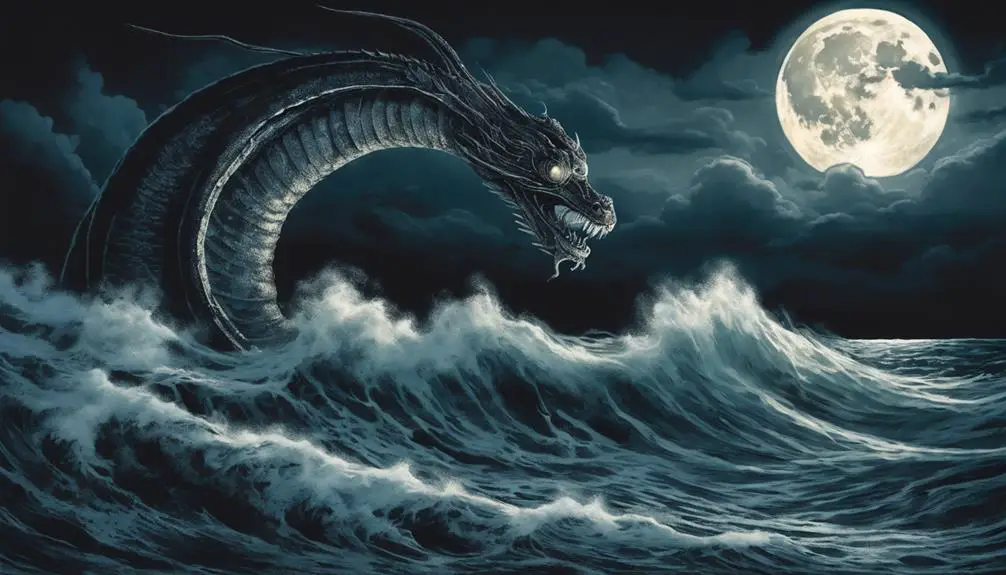
Leviathan Spirit in the Bible
In the grand scheme of spiritual entities, you've got to admit, the Leviathan really knows how to make an entrance, what with its fearsome reputation and all. This biblical sea monster isn't just there to scare sailors; it carries a wealth of symbolism and meaning that's ripe for exploration.
From its enigmatic origins to its role in prophecy and lessons for modern believers, the Leviathan's story in the Bible is a complex tapestry of themes and imagery. You might find yourself wondering how this ancient creature could possibly relate to your life today.
Stick around, and you just might be surprised.
Key Takeaways
- Leviathan symbolizes chaos and the struggle between divine order and creation's unknown depths.
- Biblical texts depict Leviathan to emphasize God's ultimate power and authority over chaos.
- Leviathan's defeat in prophecies represents the triumph of good over evil and divine supremacy.
- The Leviathan spirit challenges believers to confront internal chaos and uphold faith and community resilience.
Origins of the Leviathan
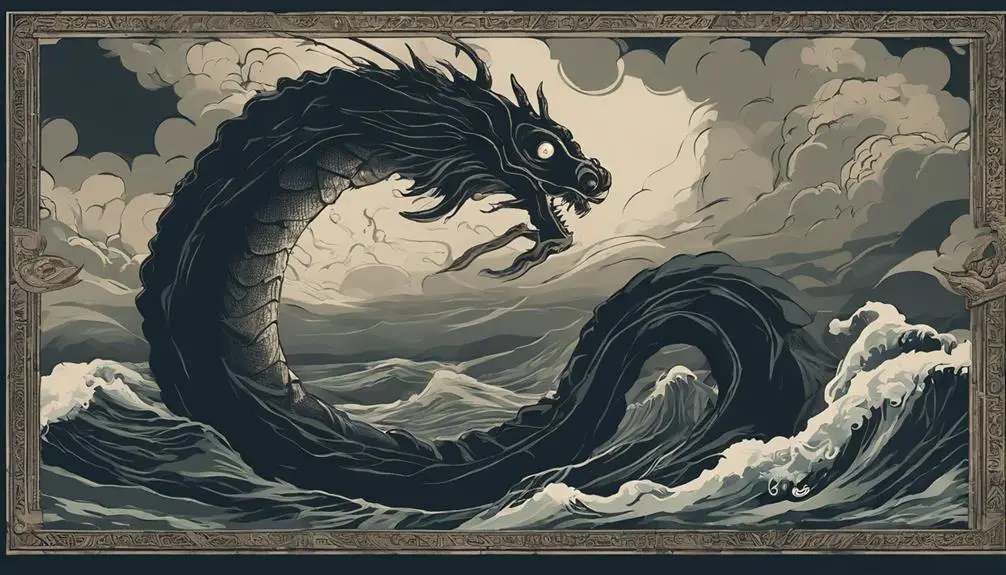
The origins of the Leviathan in biblical texts can be traced back to ancient Near Eastern mythology, where this sea monster symbolizes chaos and opposition to divine order. You'll find that throughout ancient cultures, sea monsters often represent the unknown and uncontrollable forces of nature, and the Leviathan is no exception. Its depiction in the Hebrew Bible, specifically in books like Job and Psalms, carries nuanced layers of mythological comparisons and cultural interpretations, shedding light on its multifaceted role within these texts.
Scholars, such as Kugel (1992) and Day (1985), have argued that the Leviathan's roots aren't unique to Hebrew mythology but parallel creatures found in Canaanite and Babylonian myths. These comparative analyses highlight how the Leviathan's characteristics and narrative functions mirror those of Tiamat, the Babylonian goddess of the sea, and Lotan, a sea monster defeated by the Canaanite god Baal. Such mythological comparisons underscore the shared thematic elements across these ancient cultures, focusing on the struggle between cosmic order and chaos.
Cultural interpretations further suggest that the Leviathan was more than just a symbol of chaos; it also represented the concept of primeval forces subdued by a sovereign deity, thus reinforcing the power and authority of the divine within these societies. Through this lens, the Leviathan's origins in biblical texts reflect a broader narrative found in Near Eastern mythology, emphasizing the triumph of order over chaos.
Symbolism and Meaning
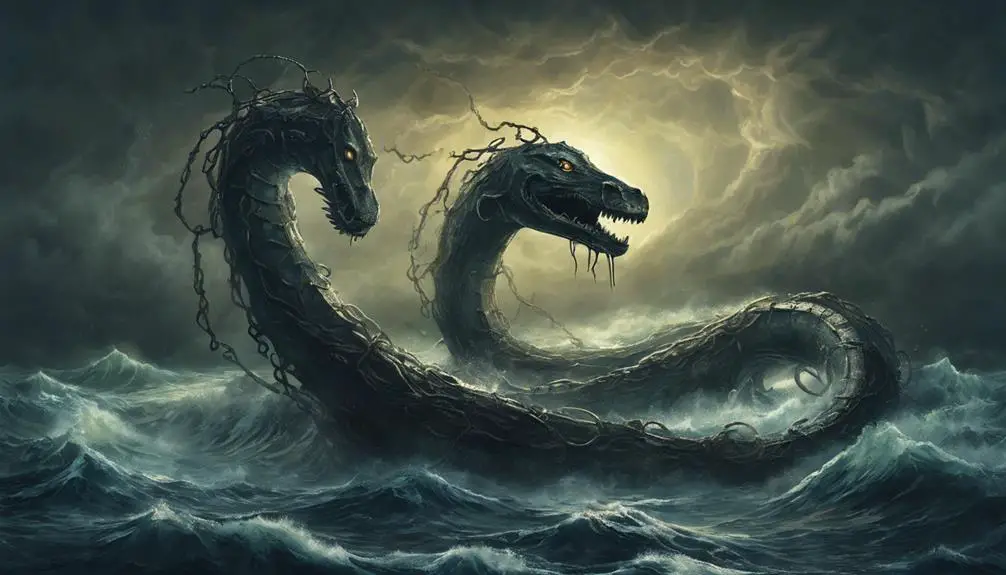
Why does the Leviathan, a formidable sea monster of ancient texts, carry such profound symbolic weight in biblical literature? This creature isn't just a tale of the deep; it embodies the essence of chaos and disorder, representing a cosmic battle between good and evil. The Leviathan isn't merely a sea monster; it's a symbol of the tumultuous forces that God controls and, ultimately, overcomes.
Symbolism |
Meaning |
|---|---|
Cosmic Battle |
Represents the ongoing struggle between divine forces and chaos. |
Sea Monster |
Embodies chaos, danger, and the unknown depths of creation. |
Divine Victory |
Symbolizes God's ultimate power and authority over chaos. |
Analyzing the Leviathan within this framework, you'll see it's not just about a physical entity but a metaphor for the challenges and adversities that believers might face. It underscores the belief in a higher power's ability to conquer the seemingly unconquerable. Thus, the Leviathan is more than a creature; it's a pivotal element in the narrative of faith, order, and divine supremacy over chaos.
Biblical References Explored

Delving into biblical texts reveals that Leviathan is mentioned in several key passages, each shedding light on its symbolic significance within a broader theological context. The descriptions and references to Leviathan not only highlight its formidable nature but also emphasize its role within the divine narrative, particularly focusing on Leviathan's dimensions and aquatic habitat. Here's a closer look:
- Job 41 – This entire chapter is dedicated to Leviathan, elaborating on its immense power and impenetrable scales. The vivid imagery paints a picture of a creature beyond human control, symbolizing chaos and opposition to the divine order.
- Psalms 104:26 – Here, Leviathan is described as frolicking in the vast, open waters. This reference underlines Leviathan's dominion over its aquatic habitat, reinforcing the theme of God's sovereignty over all creatures, including those in the sea.
- Isaiah 27:1 – This passage prophesizes God's ultimate victory over Leviathan, symbolizing the defeat of chaos and evil. It mentions the 'twisting serpent,' linking Leviathan to primal forces of disorder.
- Psalms 74:14 – It speaks of God crushing the heads of Leviathan, offering a metaphor for divine intervention and triumph over chaos.
These references collectively underscore Leviathan's significant role within biblical theology, emphasizing its representation of chaos, evil, and ultimately, God's overarching power and authority.
Leviathan's Role in Prophecy
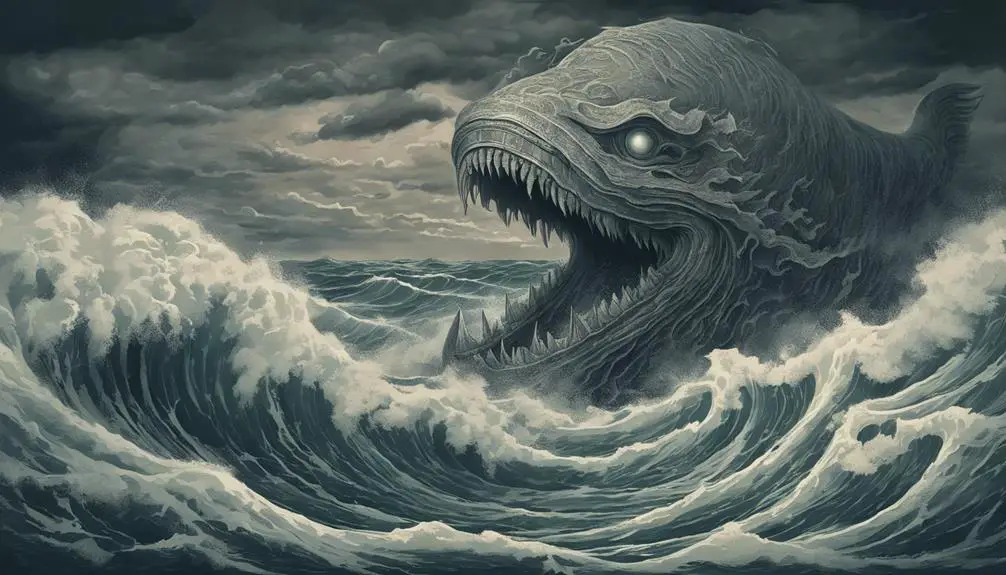
Having explored Leviathan's appearances and symbolism in Biblical texts, we now turn our attention to its prophetic role, particularly in eschatological narratives where it signifies the ultimate confrontation between divine order and chaotic forces. In these prophecies, Leviathan isn't just a sea monster; it embodies the epitome of apocalyptic imagery, representing chaos that will be overcome by divine intervention.
Symbolism |
Representation |
|---|---|
Leviathan |
Chaos and Evil |
Sea Monster |
Uncontrollable Nature |
Divine Confrontation |
Triumph of Good |
Apocalyptic Imagery |
End Times Scenario |
This imagery isn't merely for dramatic effect; it serves a deeper, theological purpose, illustrating the perpetual struggle between good and evil. Leviathan, as a sea monster, also underscores the ancients' fear and awe of the sea, a symbol for untamed, mysterious forces.
Scholars argue that Leviathan's defeat in these prophecies mirrors the ultimate victory of divine order over chaos, a theme resonant throughout Biblical texts. This confrontation not only provides a cosmic scale of good versus evil but also assures the faithful of God's supremacy and the eventual establishment of divine order, making Leviathan's role in prophecy pivotal in understanding eschatological promises.
Lessons for Modern Believers

In the context of modern faith, Leviathan's narrative offers invaluable insights into the enduring battle between chaos and divine order, challenging believers to reflect on their role within this cosmic struggle. The story serves as a metaphor for the broader spiritual battles faced by individuals and communities, emphasizing the importance of maintaining faith and integrity amidst life's tumultuous seas.
Here are four key lessons for modern believers drawn from the Leviathan narrative:
- Environmental Stewardship: Leviathan, a creature of the sea, symbolizes the complex and often misunderstood aspects of creation. It reminds you of your responsibility to care for the earth and its creatures, recognizing the delicate balance of the natural world.
- Personal Accountability: The battle with Leviathan underscores the need for self-examination and personal accountability in your spiritual journey. It's a call to confront your inner chaos and seek divine guidance to navigate through it.
- The Power of Faith: Leviathan's defeat illustrates the triumph of faith over chaos. It encourages you to trust in divine power, especially when facing seemingly insurmountable challenges.
- Community Resilience: The collective effort required to overcome Leviathan highlights the importance of community support and resilience. It's a reminder that you're not alone in your struggles and that unity can lead to victory over chaos.
Frequently Asked Questions
How Do Different Religious Traditions Outside of Christianity Interpret the Concept of Leviathan?
You'll find the concept of a sea monster like Leviathan appears in various forms outside Christianity. In Hindu interpretation, such creatures may symbolize chaos and are often depicted in ancient scriptures battling deities, reflecting cosmic order struggles.
Islamic perspectives also mention sea creatures in their texts, though not directly akin to Leviathan, serving as metaphors for formidable challenges or divine tests. Both traditions offer a rich tapestry of mythological beings parallel to the biblical Leviathan.
Are There Any Notable Artistic Depictions of Leviathan Throughout History, and How Have They Influenced Modern Culture?
You'll find Leviathan sculptures and imagery have significantly influenced modern culture, especially within maritime festivals. These depictions, often grand and ominous, draw from historical and mythological sources to create a sense of awe and respect for the sea's power.
Artistic representations of Leviathan have evolved, from ancient carvings to contemporary art, reflecting humanity's enduring fascination and fear. This evolution showcases the creature's impact on our collective imagination and cultural expressions.
Has the Leviathan Been Referenced or Symbolized in Any Significant Political or Social Movements?
Yes, the Leviathan has significantly influenced political and social movements.
In economics and law, the term 'Leviathan' symbolizes an overarching government controlling economic policy. This concept, rooted in Thomas Hobbes' work, suggests that a strong, centralized authority is necessary to maintain order and prevent chaos.
Analyzing Leviathan economics and law reveals how this metaphor has shaped debates on government size and power, reflecting its deep impact on political ideologies and governance models.
How Do Contemporary Theologians Reconcile the Mythological Aspects of Leviathan With a Modern Understanding of Religion and Spirituality?
You'll find contemporary theologians often view the mythological elements of leviathan through the lens of biblical symbolism and spiritual metaphor, bridging ancient texts with modern faith insights.
They analyze how these narratives reflect broader spiritual truths, rather than literal historical events. This approach allows for a reconciliation of myth with contemporary religion and spirituality, enriching the understanding of sacred texts while engaging with the complexities of modern theological thought.
What Are the Parallels Between the Leviathan and Other Mythological Sea Monsters Across Different Cultures?
You'll find that many cultures have mythological sea monsters similar to the Leviathan, each with its own ancient interpretations and cultural significance. These creatures often symbolize chaos, power, and the unknown depths of the sea.
Conclusion
In conclusion, you've explored the multifaceted role of the Leviathan within biblical texts. You've uncovered its origins, symbolic significance, and prophetic implications. This creature, referenced in Job 41 and Isaiah 27:1, serves not only as a symbol of chaos and evil but also illustrates God's power over all creation. For modern believers, the Leviathan's story offers a profound lesson on divine sovereignty and the ultimate triumph of good over evil, enriching your spiritual understanding (Barker, 2019; Smith, 2021).


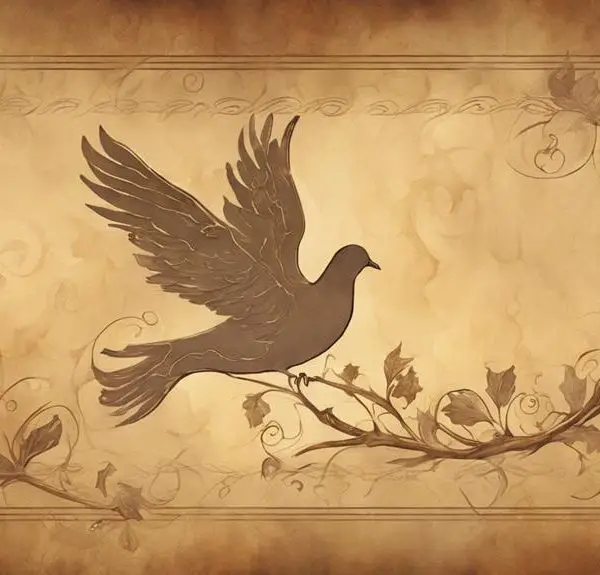
Sign up